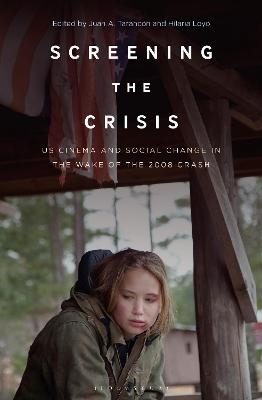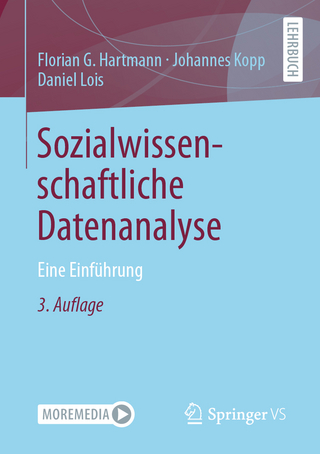
Screening the Crisis
Bloomsbury Academic USA (Verlag)
978-1-5013-8812-5 (ISBN)
Hilaria Loyo is Associate Professor at the University of Zaragoza, Spain. She has written mainly on Hollywood film stars, the cultural reception of Marlene Dietrich, the representation of whiteness and Hollywood female blondes, trauma studies and transnational exchanges in Isabel Coixet’s films, and on the politics of space in cinema. Her work has appeared in various anthologies and journals. Her most recent publication can be found in The Velvet Light Trap (2019). Juan A. Tarancón is Lecturer at the University of Zaragoza, Spain. He has written on film genre theory, on representations of immigration and Mexican American culture, and on the work of John Sayles and Carlos Saura. His work has appeared in CineAction, Cultural Studies, The Quarterly Review of Film and Video, New Cinemas, and varied Spanish scholarly journals. He is co-editor of Global Genres, Local Films: The Transnational Dimension of Spanish Cinema (2016).
List of Figures
Acknowledgements
Notes on Contributors
Foreword: Crisis and Critique
Timothy Corrigan (University of Pennsylvania, USA)
Introduction: Cinema and the Age of Crisis
Juan A. Tarancón (University of Zaragoza, Spain) and Hilaria Loyo (University of Zaragoza, Spain)
I. US Cinema in the Age of Crisis
1. It’s Always Been Crisis: Hollywood History
Toby Miller (University of California, Riverside, USA) and Bill Grantham (Loughborough University, UK)
2. Independent Films in an Age of Crisis: Illuminating the Lives of Outsiders in Neoliberal America
Cynthia Baron (Bowling Green State University, USA)
II. Labor Crisis and the Neoliberal Subject
3. Limitless?: Neoliberal Femininity in the Post-recessionary Chick Flick
Beatriz Oria (University of Zaragoza, Spain)
4. Screening Recessions through a Gendered Lens: Nostalgic and Critical Revisions of the Past from the Post-2008 Crisis Perspective
Elena Oliete-Aldea (University of Zaragoza, Spain)
5. Screening Neoliberlism in Nightcrawler and The Wolf of Wall Street
Stephen Felder (Irvine Valley College, USA)
III. Technology and the State of Surveillance
6. The Shock Doctrines of The Social Network: Zuckerberg, Trump, and Surveillance Capitalism in Big-tech Cinema
Ian Scott (Manchester University, UK)
7. “I Figured You were Probably Watching Us”: Performing Gender and Citizen Surveillance in Ex-Machina
Kayla Meyers (Independent Scholar, USA)
IV. The Housing Crisis and the Home Question
8. Stand Your Ground: Neoliberal Horrors, The Purge Franchise, and the Allegorical Moment of US Trauma
Tony Grajeda (University of Central Florida, USA)
9. Horror, Race, and the Economics of Interiority: Homeowners in the Blumhouse Universe
Leah Pérez (University of Southern California, USA) and William J. Simmons (University of Southern California, USA)
10. Resignifying the National Home: Gendered Domopolitics and Neoliberal Geographies of Exclusion in Debra Granik’s Cinema
Hilaria Loyo (University of Zaragoza, Spain)
V. Politics, Affect, and the Crisis of Public Values
11. S. Craig Zahler and White Identity Auteurism in the Age of Trump
Carlos Gallego (St. Olaf College, USA)
12. A Crisis of Confidence: Fracture and Malaise in the US Polity in Dragged Across Concrete
Fabián Orán Llarena (University of La Laguna, Spain)
13. "I Guess It Comes from Being Poor": Inequality, Affect, and Point of View in The Florida Project
Juan A. Tarancón (University of Zaragoza, Spain)
VI. Ecological Crisis and Visions of the Future
14. Who the Earth Is for: Reframing Rural Landscapes as Collective Polities in Leave No Trace and Beasts of the Southern Wild
Tim Lindemann (Queen Mary University of London, UK)
15. Turning Over a New Leaf: Exploring Human-Tree Relationships in Film
Virginia Luzón Aguado (University of Zaragoza, Spain)
VII. Crisis and Violence in the Borderlands
16. “No One to Call Around Here. These Boys Is on Their Own”: The Postindustrial Frontier in Hell or High Water and the Western as a Landscape of the Crisis
Luis Freijo (University of Birmingham, UK)
17. Bad Hombres at the Border: Masculinity and Mexico in Rambo: Last Blood
Gregory Frame (Bangor University, UK)
18. We’re No Longer Here: Ya no estoy aquí as an Example of Neoliberalism and Economic Crisis in the US-Mexico Borderlands
Roberto Avant-Mier (The University of Texas at El Paso, USA)
Bibliography
Index
| Erscheinungsdatum | 30.07.2022 |
|---|---|
| Zusatzinfo | 13 bw illus |
| Verlagsort | New York |
| Sprache | englisch |
| Maße | 152 x 229 mm |
| Themenwelt | Kunst / Musik / Theater ► Film / TV |
| Sozialwissenschaften ► Kommunikation / Medien ► Medienwissenschaft | |
| ISBN-10 | 1-5013-8812-6 / 1501388126 |
| ISBN-13 | 978-1-5013-8812-5 / 9781501388125 |
| Zustand | Neuware |
| Haben Sie eine Frage zum Produkt? |
aus dem Bereich


